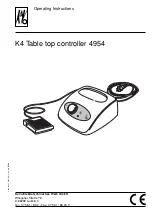
BIT 4886 051010
B-7
B.29 [SOURce:]LIST:COUNt:SKIP COMMAND
LIST:COUN:SKIP
Syntax:
Short Form: LIST:COUN:SKIP nn
Long Form: LIST:COUNt:SKIP nn
nn = <int_value 0 to 255>
Description:
Allows beginning steps of list-generated waveform to be run once, then ignored.
When a list is to be repeated using LIST:COUNT, this command allows the user to skip the first nn
steps once the full set has been executed. After the first iteration (which executes all steps), the first
nn steps are skipped. The LIST:COUN:SKIP command allows the user to precondition a list-generated
waveform by setting unique conditions at the beginning that are not repeated for the rest of the repeti-
tions. LIST:CLEar sets nn to 0. Only works in LIST:DIR UP mode; if LIST:DIR DOWN is issued, this
command has no effect. Related Commands: LIST:COUN, LIST:COUN:SKIP?, LIST:SEQ, LIST:DIR,
LIST:CLE. (See example, Figures B-2 and B-3.)
B.30 [SOURce:]LIST:COUNt:SKIP? QUERY
LIST:COUN:SKIP?
Syntax:
Short Form: LIST:COUN:SKIP?
Long Form: LIST:COUNt:SKIP?
Return Value: <int_value>
Description:
Identifies how many steps will be skipped the first time the list is executed.
Returns value set by
LIST:COUN:SKIP command. (See examples, Figure B-3.)
B.31 [SOURce:]LIST:CURRent COMMAND
LIST:CURR
Syntax:
Short Form: LIST:CURR <exp_value>, <exp_value>, . . . (to max of 1002 data points)
Long Form: LIST:CURRent <exp_value>, <exp_value>, . . . (to max of 1002 data points)
<exp_value> = digits with decimal point and Exponent, e.g., 2.71E1 for 27.1
Description:
Adds the current value (in Amps) to list.
This command sequentially adds LIST:CURRent values to
the main channel List Data Table locations illustrated in Table B-2. Starting location is indicated by
LIST:CURR:POIN? These locations correspond to the default sequence (LIST:GEN DESQ). The max-
imum number of entries is 1002. Since the input buffer of the BIT 4886 has a limit of 253 characters,
multiple commands are necessary to complete the full 1002 entries of the list. If LIST:VOLT has any
entries, an error message: -221,"Settings conflict" is posted in the error queue. Related Commands:
LIST:CURR:POIN?. (See example, Figure B-3.)
B.32 [SOURce:]LIST:CURRent? QUERY
LIST:CURR?
Syntax:
Short Form: LIST:CURR?
Long Form: LIST:CURRent?
Return Value: <value1>, <value2>, . . . to <value16>
Description:
Identifies the parameters (main channel) entered for the list.
Starting at location established by
LIST:QUERy, returns comma-separated list of up to 16 values indicating the main channel parameters
entered, i.e., the contents of main channel locations of Table B-2. Related Commands: LIST: CURR,
LIST:QUERy. If LIST:VOLT has any entries, an error message: -221,"Settings conflict" is posted in the
error queue. (See example, Figure B-3.)
B.33 [SOURce:]LIST:CURRent:POINts? QUERY
LIST:CURR:POIN?
Syntax:
Short Form: LIST:CURR:POIN? Long Form: LIST:CURRent:POINts?
Return Value: <value> (0 to 1001)
Description:
Identifies the total number of points in a list and the next location to be filled by LIST:CURR
command.
The LIST:CURR pointer is initially at 0 via LIST:CLE. For each data point entered by a
LIST:CURR command the list pointer is incremented. If LIST:CURR:POIN? returns 5, the LIST:CURR
pointer is at 5, indicating there are 6 data points comprising the list. If LIST:VOLT has any entries, an
error message: -221,"Settings conflict" is posted in the error queue.Related Commands: LIST:CURR.
(See example, Figure B-3.)
TABLE B-2. LIST DATA TABLE
Location (DSEQ)
0
1
2
3
4
5
6
7
8
9
10 11 12 13 14 15 16 17
. . . . . . . . .
1001
Main Channel (commanded mode)
LIST:CURRent or LIST:VOLTage
. . . . . . . . .
LIST:DWELl
. . . . . . . . .
NOTE: FUNC:MODE determines whether main channel is for voltage or current. FUNC:MODE CURR must precede LIST:CURR commands,
FUNC:MODE VOLT must precede LIST:VOLT commands
















































